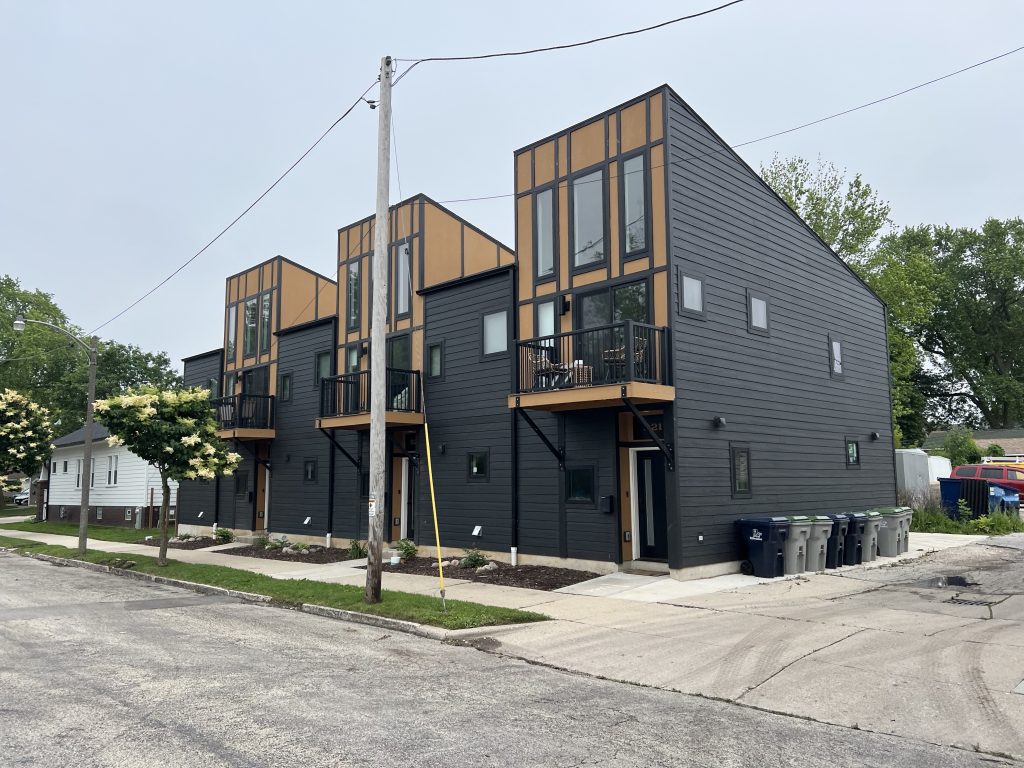Housing Plan Wins Key Council Committee Endorsement
Revised 'Growing MKE' is not perfect, but council should still adopt it say sponsors.
Three years and one major speed bump after the Department of City Development (DCD) got the green light to pursue it, a new housing development plan for the city of Milwaukee is poised to be adopted.
On Tuesday, a key Common Council committee unanimously endorsed the plan, now known as the Housing Element of the City of Milwaukee’s Comprehensive Plan.
“Our hope is that this will help us to address the housing crisis by diversifying and maximizing housing options for people of the city of Milwaukee,” said Alderwoman JoCasta Zamarripa, a co-sponsor, in opening what ended up being a nearly two-hour discussion.
The plan calls for allowing the development of more housing options, “missing middle” options like townhomes, cottage courts and carriage homes, as well as eliminating technical barriers for developing apartments and condominiums near transit lines.
However, the revised proposal also drops several previously proposed items, including the legalization of duplexes citywide and allowing up to four-unit buildings in many locations across the city. After a highly contentious July 2024 meeting, a 49-page harm and benefit analysis was created to outline the policy’s expected impacts and goals, including attempting to prevent gentrification. It augments what is itself only a 72-page plan.
“Although it is not perfect, we have to err on the side of getting something done. Our residents are looking for us to get something done,” said co-sponsor Sharlen P. Moore.
“These archaic codes that we have right now are simply not working. We have far too many vacant lots. We have far too many desolate houses. We have a lot of creative individuals that are eager to do something different from the former status quo,” said co-sponsor Mark Chambers, Jr.
But Zoning, Neighborhoods & Development Committee Robert Bauman, despite voting for the plan Tuesday, isn’t in love with it.
“I just want the public to understand that nothing we do today, assuming this is approved, will result in one new affordable housing unit,” he said.
While the plan changes city policy, it does not immediately change the zoning code. The council would need to approve specific changes in the future.
“The plan in front of you, on its own, does not change any regulations, ordinance or budgetary decisions… That’s how comprehensive planning has been for the past few decades in Milwaukee. We use this process to serve as a roadmap, a vision document to inform future legislation,” said DCD deputy commissioner Sam Leichtling. Putting the changes, which include earlier plans on preventing displacement and creating affordable housing, into the comprehensive plan would give them the “force of law,” he said. “We will fully acknowledge that this plan doesn’t solve all aspects of the housing crisis.”
The plan, formerly known as “Growing MKE,” was rebranded in response to criticism that it was focused on Mayor Cavalier Johnson‘s goal of one million residents instead of current city residents.
Leichtling, the former planning manager, said that even with Milwaukee’s population shrinking in recent decades, it still needs more housing, given the reduction in household size. “We do need more housing for our existing population,” he said.
Bauman also explicitly stated what the late alderman Jonathan Brostoff, the initial lead sponsor, had long warned would be tough for the council to swallow: allowing more development by right (without legislative approval) would be difficult for some council members to approve. “This was a direct assault on aldermanic involvement in the development process,” said Bauman of the 2024 proposal. He said all council members want affordable housing. “What we are against is losing the ability to influence the developments in our district, which the original version directly attacked.”
“We have strived throughout the process to find balance,” said Leichtling.
The new version, Bauman acknowledged, restores more control by not allowing things like duplexes, three-unit or four-unit buildings in many areas.
“I would call it more tweaks at the knobs and dials, not a major rewrite of the zoning code,” said Leichtling of the resulting plan.
The plan became a hot button issue in the special election to replace Brostoff, with some East Side residents claiming it was an attack on single-family zoning.
DCD planner Amy Oeth said the plan was clear in noting that the city still wants to see single-family homes developed.
The revised plan also includes more language to indicate the city will favor equity-based approaches to development. “To the extent allowed by state law, we want to prioritize neighborhood-based developers, owner occupants and owner occupancy and affordability in how we dispose of that land,” said Leichtling of selling the thousands of lots owned by the city.
The revisions have turned two of the major opponents, Metcalfe Park Community Bridges and Ald. Russell W. Stamper, II, into supporters.
“It was a plan that was being done to us, not with us,” said Metcalfe Park deputy director Melody McCurtis. While DCD held a lengthy outreach process in 2023 and early 2024, the department was told it wasn’t enough when the City Plan Commission reviewed the plan last July. Now DCD has drawn praises for its revamped outreach. “This updated housing element plan reflects that journey. It is the product of what can happen when people commit to hard conversations.”
Stamper was among the five committee members who voted for the plan Tuesday. Joining him were Bauman, Milele A. Coggs, DiAndre Jackson and Scott Spiker. Ald. Peter Burgelis, who is not a member of the zoning committee, appeared at the meeting and was added as a co-sponsor.
The full council will review the proposal next week.
Several community members testified in favor of the proposal, including Riverworks Development Corporation head Darryl Johnson, accessibility services advocate Brian Peters, educator and developer Alice Pugh and VIA CDC Executive Director JoAnna Bautch.
“No plan is perfect, but the cost of inaction is too high,” said Bautch, the sister of alderwoman Zamarripa.
The group Together for Homes, a coalition backed by 1000 Friends of Wisconsin, is among the dozens of organizations endorsing the proposal. “Housing cost and availability was the number one issue for folks ages 18 to 35, it was the number two issue only under public safety, for everyone else,” said member Jenny Tasse of a 1000 Friends survey.
“The plan before you today is a monumental shift in the vision and landscape for the city,” said coalition member and Narvarte Development founder Montavius Jones. He said the city must do what it can within its power to create affordable housing. “Housing costs are just too high and there is a housing shortage… What we control, we must control.”
When the council meets on July 15, it could also vote on a zoning change to allow carriage homes, officially “accessory dwelling units,” to be developed. It’s one of two policies that Bauman and Council President José G. Pérez brought forward as elements of Growing MKE they supported. DCD and the Housing Element co-sponsors have backed the proposal. In April, the council unanimously passed the second policy, which created a new RT5 zoning designation for up to eight units of housing, but didn’t immediately assign it to any parcels.
Legislation Link - Urban Milwaukee members see direct links to legislation mentioned in this article. Join today
If you think stories like this are important, become a member of Urban Milwaukee and help support real, independent journalism. Plus you get some cool added benefits.
More about the Growing MKE proposal
- Milwaukee Seeks ‘Missing Middle’ Housing Developers - Jeramey Jannene - Nov 24th, 2025
- Milwaukee Aims To Build ‘Missing Middle’ Housing in 2026 - Jeramey Jannene - Oct 29th, 2025
- Despite Its Passage, ‘Growing MKE’ Still Not A Done Deal - Jeramey Jannene - Sep 16th, 2025
- Mayor Signs Housing Legislation, Praises Late Jonathan Brostoff - Jeramey Jannene - Jul 16th, 2025
- Council Adopts Growing MKE Plan - Jeramey Jannene - Jul 15th, 2025
- After Lengthy Debate, Council Legalizes Carriage Homes - Jeramey Jannene - Jul 15th, 2025
- Housing Plan Wins Key Council Committee Endorsement - Jeramey Jannene - Jul 9th, 2025
- City Hall: Committee Waters Down Proposed ‘Granny Flat’ Plan - Jeramey Jannene - Jun 17th, 2025
- Madison Pursuing Its Own Zoning Reform Similar To ‘Growing MKE’ - Sarah Lehr - Jun 12th, 2025
- ‘Growing MKE’ Proposal Picks Up Key Endorsement - Jeramey Jannene - Jun 2nd, 2025
Read more about Growing MKE proposal here
Political Contributions Tracker
Displaying political contributions between people mentioned in this story. Learn more.
- October 23, 2024 - DiAndre Jackson received $75 from Sharlen P. Moore
- April 23, 2019 - JoCasta Zamarripa received $100 from Peter Burgelis
- March 4, 2016 - Cavalier Johnson received $35 from Sharlen P. Moore
- February 20, 2016 - Cavalier Johnson received $250 from Robert Bauman
- May 5, 2015 - José G. Pérez received $10 from Cavalier Johnson
- May 5, 2015 - José G. Pérez received $100 from JoCasta Zamarripa






















